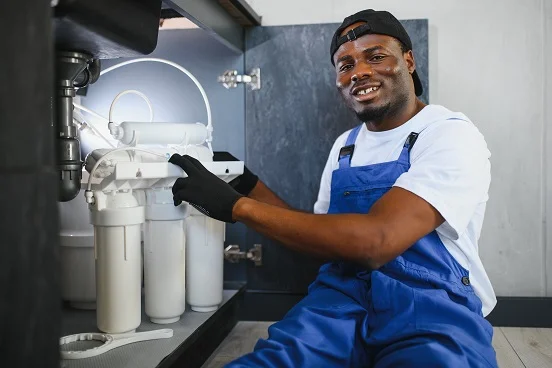If you’ve ever seen white spots on your dishes, a cloudy shower door, or felt dry skin after washing your hands, you’ve already met the troublemaker — hard water. Millions of homes face this issue every day. The simple and lasting solution is installing a water softener, a system that removes hardness minerals like calcium and magnesium from your tap water.
In this guide, we’ll break down every important thing you should know about water softener benefits, why it’s worth the investment, how it protects your home, and how real families are saving money and improving their health because of it.
What Is a Water Softener and Why Does It Matter?
A water softener is a home system that removes hardness minerals using a process called ion exchange. These minerals — mainly calcium and magnesium — are what make water “hard.” Over time, they create limescale in pipes, block showerheads, and ruin appliances.
Softened water, on the other hand, keeps your home running efficiently. It not only makes cleaning easier but also improves your skin, hair, and energy bills. Think of it as a simple home upgrade that protects your entire plumbing system while giving you better comfort every day.
1. Health and Hygiene Benefits
Hard water can leave soap scum on your skin and hair. You might feel clean after a shower, but a thin mineral layer stays behind, leading to dryness, dull hair, and irritation.
With a water softener, soap rinses off completely. You’ll notice smoother skin, softer hair, and clothes that feel fresh even after several washes. Dermatologists often recommend soft water for people with sensitive skin or conditions like eczema.
It’s not just about beauty — it’s about comfort and health. Cleaner water means fewer bacteria and mineral residues on your body and surfaces.
2. Protects Plumbing and Appliances
One of the biggest benefits of a water softener is how it guards your home’s plumbing system. Hard water minerals stick to the inside of pipes, slowly narrowing them like plaque in arteries. This buildup causes low water pressure and can eventually damage your pipes.
Soft water prevents this buildup entirely. Your water heater, washing machine, dishwasher, and coffee maker all last longer and work more efficiently.
According to the U.S. Department of Energy, hard water buildup can increase water heater energy use by up to 29%. Installing a softener can lower that number and extend appliance life by several years.
(External link: energy.gov)
3. Saves Money Every Month
A properly maintained Water Softener Benefits can save hundreds of dollars annually. Here’s how:
- You’ll use less soap and detergent because soft water makes them lather better.
- Your water heater won’t waste energy fighting mineral buildup.
- Your plumbing will need fewer repairs.
Soft water even helps your clothes last longer since fibers aren’t damaged by harsh minerals.
In short, a softener doesn’t just protect your home — it also protects your wallet.
4. Cleaner Dishes, Brighter Laundry, Easier Cleaning
One of the most visible water softener benefits is in your daily cleaning routine. Dishes come out spotless, laundry stays soft, and bathrooms lose that chalky white film.
Hard water often leaves stains on tiles, faucets, and glass. With softened water, you’ll spend far less time scrubbing — and far less money on cleaning products.
For families who value hygiene and convenience, the difference is night and day.
5. Eco-Friendly Home Upgrade
Soft water systems aren’t just about comfort; they’re also a green home choice. Because appliances run more efficiently and detergents work better, you reduce water waste and chemical runoff.
Natural resource experts have shown that households with softeners use up to 40% less cleaning products overall. That means fewer chemicals go down the drain and less plastic waste from bottles.
So, if you care about sustainability, a softener fits perfectly into an eco-conscious lifestyle.
6. Real-Life Case Study: A Family in Arizona
Meet the Johnson family from Tucson, Arizona. They had been battling hard water for years — constant limescale, faded clothes, and a water heater that needed repair twice in one year.
After installing a dual-tank water softener, they noticed changes immediately. Their dishes sparkled, their showers stayed cleaner, and the white spots disappeared. More importantly, their energy bill dropped by nearly 20% within six months.
Mrs. Johnson shared,
“I didn’t realize how much money and effort we were wasting. Now the water feels softer, and even our skin and hair are healthier. It’s one of the best upgrades we’ve made.”
Their story proves that softened water isn’t a luxury — it’s a necessity for comfort and savings.
7. How to Maintain a Water Softener
While a softener doesn’t need much maintenance, regular care helps it last for decades.
Here’s a quick maintenance checklist (only bullet list in article):
- Check the salt level every 3–4 weeks.
- Clean the brine tank twice a year.
- Use high-quality softener salt pellets.
- Inspect for salt bridges or residue buildup.
- Flush the system if water feels slippery or salty.
You can also read our related guide here:
How to Clean Water Storage Tank
8. Water Softener Benefits Myths You Should Ignore
Some people believe soft water tastes salty or is unsafe for drinking — that’s false. The sodium added is minimal and far below the daily intake limit. In fact, many hospitals and hotels use softened water safely every day.
Another myth is that water softeners waste water. Modern systems are highly efficient, regenerating only when needed. The long-term water savings from improved appliance performance easily outweigh the small amount used in the regeneration process.
9. Choosing the Right Water Softener
If you’re planning to buy one, focus on size and capacity. Match your system to the hardness level of your local water and household usage.
Smaller homes may do well with a cabinet-style softener, while larger families often prefer dual-tank systems for uninterrupted supply. Look for certifications like NSF/ANSI 44, which guarantee performance and safety standards.
If you’re not sure, get a professional water test kit or hire a certified water treatment specialist for accurate guidance.
10. Global Importance of Water Softening
Hard water isn’t just a U.S. issue — it’s a worldwide problem. From India and the UK to Australia and South Africa, millions of homes struggle with scale buildup and costly appliance repairs.
International studies show that around 80% of households globally use hard water, making water softener systems an essential part of modern home maintenance.
So, wherever you live, softened water means better hygiene, comfort, and sustainability.
Conclusion
A Water Softener Benefits is more than just a comfort appliance — it’s a health, home, and financial upgrade all in one. From cleaner bathrooms to lower bills and longer-lasting appliances, the benefits of soft water touch every corner of your life.
It’s a smart investment that pays you back through comfort, savings, and peace of mind.
Frequently Asked Questions (FAQs)
1. Are Water Softener Benefits Safe for Drinking Water?
Yes. The added sodium is extremely low and safe for healthy adults. If you’re on a low-sodium diet, you can use a separate tap filter for drinking water.
2. How often should I service my softener?
Typically, every 6–12 months. Regular servicing keeps it efficient and prevents salt buildup.
3. Does soft water really save energy?
Absolutely. The U.S. Department of Energy confirms that clean, scale-free systems use less power, improving energy efficiency by up to 30%.
4. Can I install a water softener myself?
Some small systems are DIY-friendly, but for best results, get professional installation to ensure proper settings and plumbing connections.
5. What’s the average lifespan of a softener?
With proper care, most units last between 10 to 20 years.
Summary
A water softener removes minerals that cause hard water problems like stains, low pressure, and appliance damage. It saves energy, improves skin and hair, and reduces cleaning time. Regular maintenance ensures long-term performance and cost savings — making it one of the smartest upgrades any homeowner can make.
Ethan Wells is the author of Water Tank Guides, a blog focused on practical tips for water tank cleaning, maintenance, and installation. His mission is to help readers keep their water clean, safe, and their tanks long-lasting through simple, easy-to-follow guides.

